Related Content
Content
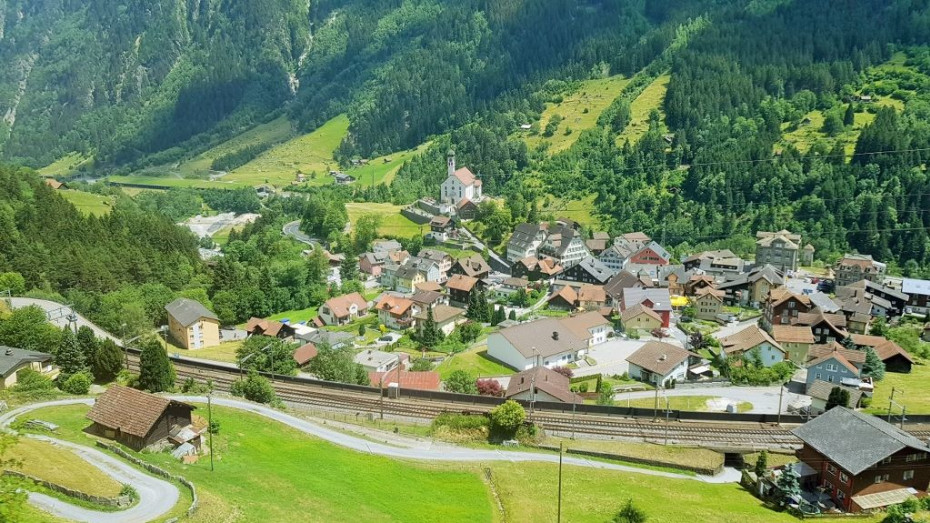
Using Rail Passes in and to/from Switzerland
This newly updated guide explains how to use the different types of pass that are available for exploring wonderful Switzerland by train
Share
Switzerland is a country where the rail journey can be as fabulous as the destination, so exploring the country by train can make for a fantastic holiday.
Using rail passes to explore Switzerland allows you to follow your own itinerary and they can also make it easier to see Switzerland by train.
Though there are multiple types of pass available, both national and regional - hence the info below which will help you choose the optimum pass, which will save you the most money!
Also something which can be misunderstood, is that all the passes referenced below, are an alternative to buying and using tickets - you use the pass(es) instead of tickets.
The passes either allow their users to simply board most trains, including all national rail services, or give access to substantial discounts - this is the scenario on some of the base station to summit mountain railways.
The discount on national rail tickets on can be obtained by using a different type of product, the Half Fare Card, which is not a rail pass.
The Concierge Service can help with planning a rail pass itinerary, either using Swiss Travel Passes, or for including the best of Switzerland on an Interrail or Eurail holiday.
Another tick in the box for using rail passes to travel around Switzerland by train is that you can be spontaneous and hop and off the trains.
Reservations aren't mandatory on the express trains between cities, including when travelling within Switzerland on international trains - though if possible avoid travelling between and from the major cities at business hours.
Reservations are also not typically available on the standard trains which operate on the network of independent mountain railways.
The three national rail passes
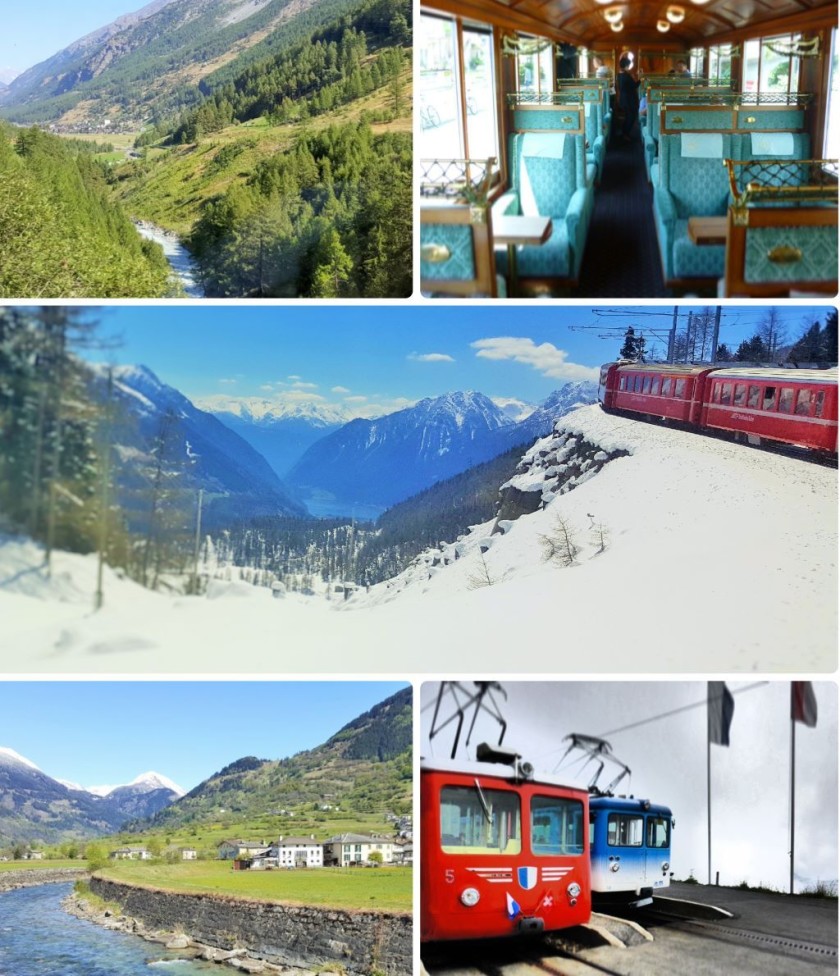
More than two dozen companies operate Swiss railways, so the big tick in the boxes of using rail passes in Switzerland, is that more often than not, they enable travellers to hop on and off trains, irrespective of which company is providing the service.
Though on some mountain railways the passes only offer a discount.
The number of railways that you can travel on for free, or at a discounted rate, varies according to which pass you are using; hence the summary below.
You can also see the details of where you can and can't use the various passes on other railway on the guide to Swiss Mountain railways.
If you want to save money when exploring all of Switzerland by train, there are three core types of pass which are also valid on any mainline train on the national network:
-
Swiss Travel Passes are valid for 3, 4, 8 or 15 days of travel on nearly all of the Swiss Mountain railways, and they also include public transport, lake boats museum/gallery entry to 500 attractions - And some mountain excursions by funiculars, cable cars and rack railways.
-
Day Passes and Saver Day Passes, which as their name suggests are valid for one day of travel and they also include public transport and lake boats.
-
Interrail Switzerland passes, which are valid for 3, 4, 5, 6 or 8 days of rail travel, including the primary mountain railways that operate the longer cross-country routes.
Interrail passes also typically allow access to a reduced rate on lake boats, but they don't include public transport, or travel on virtually all of the cable cars/gondolas or funiculars.
Eurail does not offer a one-country pass for Switzerland.
The regional passes
You don't need to explore all of Switzerland by train for rail passes to be great value for money.
There are multiple regional passes available - and you can use the Content Menu to jump to more info about each of them.
-
The Berner Oberland Pass= a pass which includes railways, funiculars and cable cars to/from Grindelwald, Interkirchen Murren, Wengen, Kandersteg, Gstaad, Lenk, the Brienz Rothorn railway and the full Golden Pass route.
A good choice for a holiday in Interlaken. -
The Jungfrau Travel Pass = all of the railways and cable cars between Interlaken and beyond Grindelwald and Lauterbrunnen to Kleine Scheidegg, plus 50% discounted travel to Jungfraujoch.
A good choice for a holiday in Interlaken. -
The Tell Pass = includes the railways, funiculars and cable cars to/from Mt Rigi, Mt Pilatus (not winter), Mt Titlis, the Luzern - Interlaken Express, the Luzern - Engelberg Express, the Brienz Rothorn (not Winter), the Stoosbahn, the Stanserhorn and Burgenstock and the boats on the Luzernsee.
A good choice for a holiday in Luzern. -
Léman - Alpes Pass = includes the railways to/from Gruyères, Rochers-De-Naye, Champery, Les Diablerets, Leysin, Villars-sur-Ollon, the 'Golden Pass' route between Montruex - Zweisimmen - Lenk and the boats on Lake Geneva.
A good choice for a holiday in Lausanne.
Half Fare Cards
Visitors to Switzerland can purchase Half Fare Guest Cards, which are valid for a month of travel.
They live up to their name as once purchased, they can be used to obtain a 50% discount on Swiss train tickets.
However, they can also be used to obtain some regional passes including Berner Oberland Passes and Tell Passes at a reduced rate.
Also on some of the mountain railways, you can only travel at a discounted rate, when using Saver Day Passes / Day Passes, if you also also travel with the Half Fare Card.
Though Half Fare Cards cannot be used to purchase Swiss Travel Passes, the reason being is that Swiss Travel Passes can exclusively be used by visitors to Switzerland - and the core reason for the availability of Half Fare Cards is to enable Swiss residents to make savings on their train travel.
If you will be travelling with children aged 6 to 15 then the Half Fare Card can be particularly good value for money, because when you buy it online and add children of this age to the travelling party, it automatically becomes a Swiss Family Card at no additional cost.
The children aged 6 to 15 at the time of the trip then travel for free when accompanied by an adult; children aged 5 and under travel for free on Swiss railways in ay case.
So once purchased they can be used to obtain the much reduced price when booking Saver Day Passes / Day Passes or Berner-Oberland Passes.
Comparison of Rail Pass validity
The level of discount on the ticket prices on the Swiss mountain railways varies according to the type of rail pass being used to make the journey.
Hence this summary of how passes can be used on the most popular routes; the percentage shown is the level of discount, so 25% = pass users pay 75% of the usual ticket cost.
The Saver Day Pass rates also apply to Day Passes.
To Jungfraujoch
Travelling on the JB Railway:
- Swiss Travel Pass = 25%
- Saver Day Pass + Half Fare Card = 25%
- Saver Day Pass + no Half Fare Card = 0%
- Interrail and Eurail = 25%
- Jungfrau Travel Pass = 100% to Eigergletscher station only, tickets required to Jungfraujoch
- Berner-Oberland = 25%
- Tell Pass = not valid
- Léman - Alpes Pass = not valid
Interlaken ↔ Grindelwald and Lauterbrunnen and Wengen
Travelling on the BOB Railway and the WAB railway between Lauterbrunnem and Wengen
- Swiss Travel Pass = 100%
- Saver Day Pass = 100%
- Interrail and Eurail = 100%
- Jungfrau Travel Pass = 100%
- Berner-Oberland = 100%
- Tell Pass = not valid
- Léman - Alpes Pass = not valid
Grindelwald ↔ Wengen via Kleine Scheidegg
Travelling on the WAB Railway:
- Swiss Travel Pass = 25%
- Saver Day Pass = 25%
- Interrail and Eurail = 25%
- Jungfrau Travel Pass = 100%
- Berner-Oberland = 25%
- Tell Pass = not valid
- Léman - Alpes Pass = not valid
Wilderswill ↔ Schynige-platte
Travelling on the SPB railway
- Swiss Travel Pass =50%
- Saver Day Pass = 50%
- Interrail and Eurail =50%
- Jungfrau Travel Pass = 100%
- Berner-Oberland = 100%
- Tell Pass = not valid
- Léman - Alpes Pass = not valid
Luzern ↔ Interlaken
Travelling on the ZB Railway:
- Swiss Travel Pass = 100%
- Saver Day Pass = 100%
- Interrail and Eurail = 100%
- Jungfrau Travel Pass = not valid
- Berner-Oberland = 100%
- Tell Pass = 100%
- Léman - Alpes Pass = not valid
Montreux ↔ Zweisimmen (Golden Pass route)
Travelling on the MOB Railway:
- Swiss Travel Pass = 100%
- Saver Day Pass = 100%
- Interrail and Eurail = 100%
- Jungfrau Travel Pass = not valid
- Berner-Oberland = 100% from 2025
- Tell Pass = not valid
- Léman - Alpes Pass = 100%
Special rates apply for travel on the Golden Pass Express.
Aigle and Bex ↔ multiple Alpine villages
- Swiss Travel Pass = 100%
- Saver Day Pass = 100%
- Interrail and Eurail = 100%
- Jungfrau Travel Pass = not valid
- Berner-Oberland = not valid
- Tell Pass = not valid
- Léman - Alpes Pass = 100%
Zermatt ↔ Gornergrat
Travelling on the GGB Railway:
- Swiss Travel Pass =50%
- Saver Day Pass + Half Fare Card = 50%
- Saver Day Pass + no Half Fare Card = 0%
- Interrail and Eurail = none
- Jungfrau Travel Pass = not valid
- Berner-Oberland = not valid
- Tell Pass = not valid
- Léman - Alpes Pass = not valid
The route of the Glacier Express (Zermatt - Brig - Andermatt - Chur - St Moritz)
Travelling on the MGB Railway and the Rhaetian Railway:
- Swiss Travel Pass = 100%
- Saver Day Pass = 100%
- Interrail and Eurail = 100%
- Jungfrau Travel Pass = not valid
- Berner-Oberland = 50% on Brig ↔ Andermatt only, no discount on the other sections of the route.
- Tell Pass = 100% on Andermatt ↔ Oberalp and Andermatt ↔ Realp, no discount on the other sections of the route.
- Léman - Alpes Pass = not valid
Special rates apply to travel on the Glacier Express.
The route of the Bernina Express (Chur and St Moritz ↔ Tirano)
Travelling on the Rhaetian Railway:
- Swiss Travel Pass = 100%
- Saver Day Pass = 100%
- Interrail and Eurail = 100%
- Jungfrau Travel Pass = not valid
- Berner-Oberland = not valid
- Tell Pass = not valid
- Léman - Alpes Pass = not valid
Special rates apply to travel in the observation cars on the Bernina Express
Mount Rigi
Travelling on the Rigi Bahn railways:
- Swiss Travel Pass =100%
- Saver Day Pass = 100%
- Interrail and Eurail = 50%
- Jungfrau Travel Pass = not valid
- Berner-Oberland = not valid
- Tell Pass = 100%
- Léman - Alpes Pass = not valid
Mount Pilatus
Travelling on the PB railway and on the gondola (cable car) between the summit and Kriens.
- Swiss Travel Pass =50%
- Saver Day Pass + Half Fare Card = 50%
- Saver Day Pass + no Half Fare Card = 0%
- Interrail and Eurail = 50%
- Jungfrau Travel Pass = not valid
- Berner-Oberland = not valid
- Tell Pass = 100%
- Léman - Alpes Pass = not valid
The Centovali Railway (Locarno ↔ Domodossola)
Travelling on the F.A.R.T. Railway
- Swiss Travel Pass = 100%
- Saver Day Pass = 100%
- Interrail and Eurail = 100%
- Jungfrau Travel Pass = not valid
- Berner-Oberland = not valid
- Tell Pass = not valid
- Léman - Alpes Pass = not valid
The Brienzer Rothorn
Riding the steam trains to the summit:
- Swiss Travel Pass = 50%
- Saver Day Pass + Half Fare Card = 50%
- Saver Day Pass + no Half Fare Card = 0%
- Interrail and Eurail = none
- Jungfrau Travel Pass = not valid
- Berner-Oberland = 100%
- Tell Pass = 100%
- Léman - Alpes Pass = not valid
Popular cable car / gondola rides
An Interrail pass also gives a discount on some cable car rides, but Swiss Travel Passes and the regional passes can also give access to discounts, or occasionally free travel.
Hence this at a glance summary of the most popular cable car routes and the level of discount each pass provides:
Eiger Express from Grindelwald
- Swiss Travel Pass = 25%
- Saver Day Pass + Half Fare Card = 25%
- Saver Day Pass + no Half Fare Card = 0%
- Interrail and Eurail = 25%
- Jungfrau Travel Pass = 100%
- Berner-Oberland Pass = 25%
Grindelwad First; from Grindelwald
- Swiss Travel Pass = 50%
- Saver Day Pass + Half Fare Card = 50%
- Saver Day Pass + no Half Fare Card = 0%
- Interrail and Eurail = 50%
- Jungfrau Travel Pass = 100%
- Berner-Oberland Pass = 50%
Grindelwad - Mannlichen - Wengen
- Swiss Travel Pass = 50%
- Saver Day Pass + Half Fare Card = 50%
- Saver Day Pass + no Half Fare Card = 0%
- Interrail and Eurail = 0%
- Jungfrau Travel Pass = 100%
- Berner-Oberland Pass = 100%
- Swiss Travel Pass = 50%
- Saver Day Pass + Half Fare Card = 50%
- Saver Day Pass + no Half Fare Card = 0%
- Interrail and Eurail = 25%
- Jungfrau Travel Pass = 25%
- Berner-Oberland Pass = 100%
- Swiss Travel Pass = 50%
- Saver Day Pass + Half Fare Card = 50%
- Saver Day Pass + no Half Fare Card = 0%
- Interrail and Eurail = 25%
- Berner-Oberland Pass = 50%
- Tell Pass = 100%
- Swiss Travel Pass = 100%
- Saver Day Pass + Half Fare Card = 100%
- Saver Day Pass + no Half Fare Card = 0%
- Interrail and Eurail = 25%
- Berner-Oberland Pass = 0%
- Tell Pass = 100%
Kriens - Fräkmüntegg - Pilatus
- Swiss Travel Pass = 50%
- Saver Day Pass + Half Fare Card =50%
- Saver Day Pass + no Half Fare Card = 0%
- Interrail and Eurail = 0%
- Berner-Oberland Pass = 0%
- Tell Pass = 100%
Using a Swiss Travel Pass:
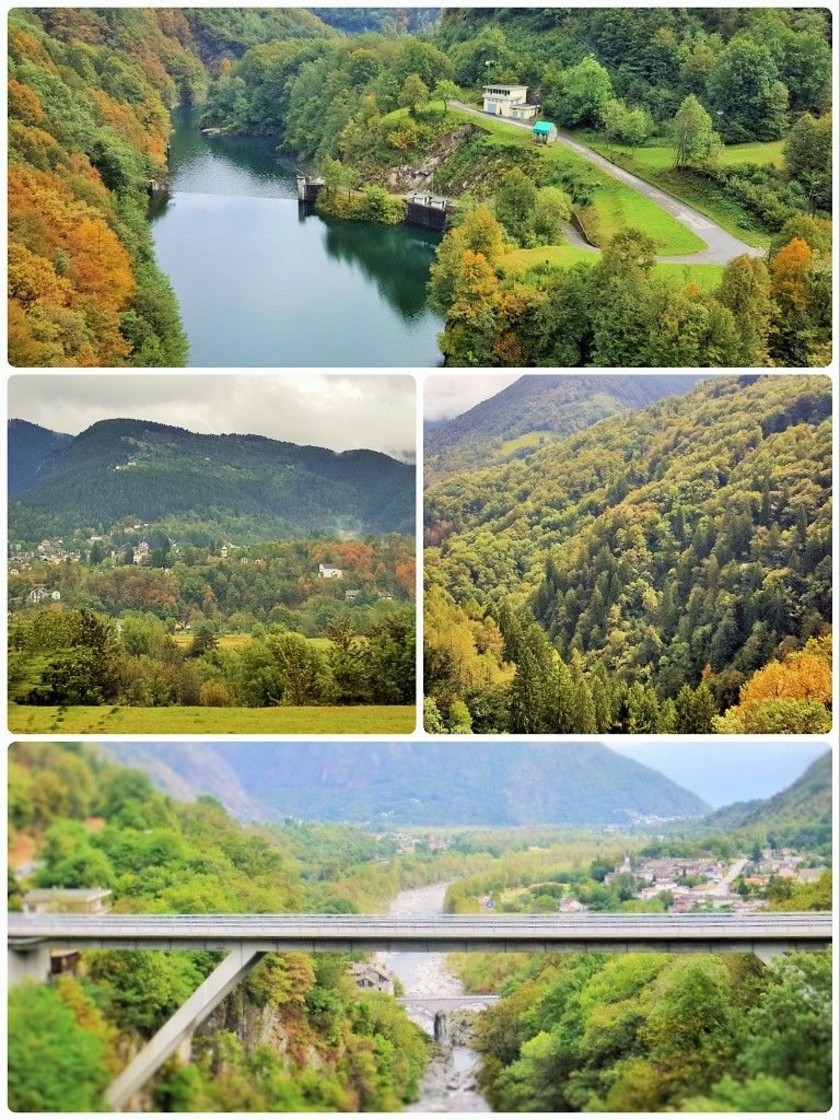
The Swiss Travel Pass simplifies Swiss rail travel by enabling its users to hop on all mainline trains between towns and cities and most of the independent mountain railways.
An additional feature is that the Swiss Travel Pass is also valid on virtually all trams and buses across Switzerland*, as well as some funiculars and cable cars/gondolas.
If you want to travel on the funiculars and cable cars/gondolas, then take a close look at the validity map - there is a link to it on the Switzerland Travel Centre guide for the Swiss Travel Passes.
The funiculars, cable cars and gondolas are the thin black lines; a solid black line means that you won't pay any extra so can hop on, but a dotted line is telling you that Swiss Travel Pass users travel at discounted rate, which is nearly always 50% of the usual ticket cost.
What's good to know is that cable cars on Mt Rigi are among the minority with a solid line.
*= The Swiss Travel Pass is also valid for some international train services, namely;
- SBB trains (not the EC trains) from Brig to Domodossola;
- The ‘Centovalli’ trains from Domodossola across the border – and on to Locarno.
Not quite every line is included, but The Swiss Travel Pass gives a 25% discount on the particularly expensive lines in the Bernese-Oberland that connect Interlaken with Jungfraujoch (but Saver Day Pass and Interrail pass users can also access the 25% discount on these trains).
Though the Swiss Travel Pass provides a 50% discount on many other lines on which Interrail pass users don't receive a discount, including the:
- The BRB between Brienz and Rothurn
- The GGB between Zermatt and Gornegrat
- The MG between Capolago and Generosso Vetta
Whether the Swiss Travel Pass will save you money also inevitably depends on how far you travel, it is best put to use facilitating fabulous multi-destination day trips across Switzerland; see below for some itinerary ideas from Basel and Zurich.
Swiss Travel Passes can be purchased for 3, 4, 8 or 15 days of travel, though you're more LIKELY to save money on the train travel element of your trip if you opt for an 8 or 15 day pass.
Three Things Particularly Worth Knowing
-
The Swiss Travel Pass will cost the same if you make the purchase when you are in Switzerland, so there's no need to be concerned about exchanges or refunds if you have to alter your travel plans.
-
There are in effect two types of Swiss Travel Pass:
- Passes which are valid for consecutive days of travel.
- Flex' passes which provide the freedom to choose travel days within a period of time, they're more expensive, but you can then ensure you're only travelling on good weather days etc.
- A big tick in the box for opting for a Swiss Travel Pass is nothing to do with rail travel, it's the fact that it includes the benefits of a Swiss Museum Pass so also allows for free admission to 500 visitor attractions
So keep this in mind when deciding whether Swiss Travel Passes are value for money compared to the other 'rail pass' options.
Using Saver Day Passes
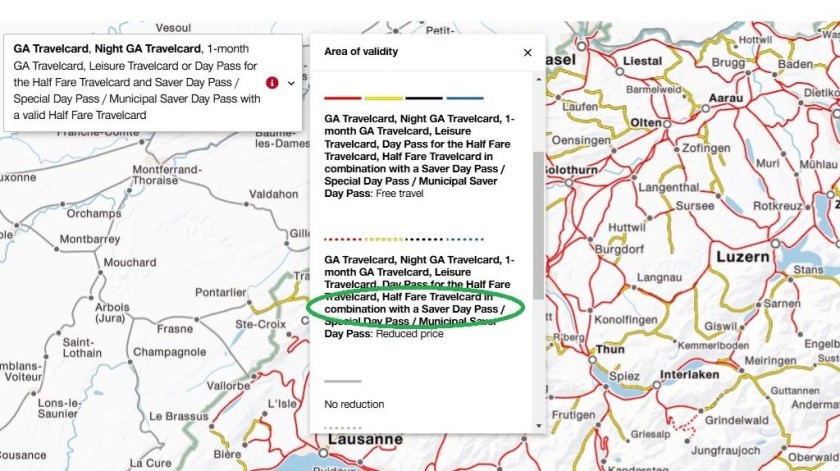
SBB also now sells 'Saver Day Passes'.
A key difference between a Swiss Travel Pass and the Saver Day Pass, is that the latter live up to their name, so they can be used to travel throughout Switzerland in a single day; meaning that you don't now have to commit to a minimum of three days of travel in order to experience multiple thrilling journeys.
The discounts dependent on a Saver Day Pass + A Half Fare Card
What can be easy to miss is that the validity map, which shows how the Saver Day Passes / Day Passes can be used to travel in Switzerland, looks similar to the validity map which shows how Swiss Travel Passes can be used, but the notes are different - as pictured above.
So on the dotted lines on the map, if you won't also be travelling with a Half Fare Card and a Saver Day Pass, 'the full price' applies;
The key railways and routes which have the dotted lines are:
- The BRB between Brienz and Rothurn
- The GGB between Zermatt and Gornegrat
- The JB between Kleine Scheidegg and Jungfraujoch
- The MG between Capolago and Generosso Vetta
- The PB between Alpnachstad and Pilatus-Kulm
- The SPB between Wilderswill and Schynige Platte
- The WAB between Grindelwald or Lauterbrunnen and Kleine Scheidegg
These are in effect the railways on which Swiss Travel Pass users qualify for a 25-50% discount.
Though if you do purchase a Half-Fare Card, and then book a Saver Day Pass(es), which as can be seen below can also be an overall money saver if you are planning at least three days of travel - You will receive the same discounts on these railways, cable cars, gondolas and funiculars that Swiss Travel Pass users can benefit from.
Plus on the validity map for the Saver Day Passes, many of the cable car and gondola routes are dotted and the same terms apply as on the dotted railways.
So if you also travel with a Half Fare card you will receive a discount on these cable car and gondola routes, but travel only with a Saver Day Pass and no discount will apply.
Though what's confusing is that the notes on the map suggest that a combination of a Saver Day Pass + a Half Fare Card is required for 'free travel' on the non-dotted lines, but that is not the case, all that's required on these lines is a Saver Day Pass.
Pricing
A sliding scale of prices is also applied to Saver Day Passes, so the further ahead you book, the cheaper the price you will pay; This sliding scale of prices doesn't apply to Swiss Travel Passes.
The Saver Day Passes can be booked up to 6 months ahead and the full rate/prices start from 52CHF 2nd class and 88CHF 1st class; these are the prices if you don't have a Half-Fare Card.
(If you will be visiting Switzerland you can purchase Half Fare Cards HERE that will be valid for 1 month).
The Saver Day Passes can't be purchased last minute on your travel dates, so you'll need to purchase them at least a day in advance.
Though be aware that to obtain a refund of a Saver Day Pass once purchased, you'll need to apparently prove that a reason, such as illness, has prevented you from making the trip.
Though it's less likely that Saver Day Passes will save you money for journeys between two destinations on which you will ONLY be travelling on SBB trains.
That's because discounted Sparbillette/Supersaver tickets are LIKELY to still be available for journeys by SBB's express trains.
These Saver Day Passes are more likely to save you money if you want to spend a whole day exploring a large area of Switzerland, including hopping on trains operated by the independent railway companies.
Travel Pass vs Saver Day Pass prices:
Before comparing Swiss Travel Pass and Saver Day Pass costs keep in mind that list of railways above, on which the Saver Day Pass users don't qualify for a discount when not also using a Half Fare Card; but see the notes below about this.
Price comparison
If you'll be using a Travel Pass valid for 8 or 15 days of travel, it will undoubtedly be a money saver, but for Travel Passes valid for 3 or 4 days, booking multiple Saver Day Passes in advance can be a cheaper option, particularly in comparison to the Flex Type of Travel Pass.
Though as can be seen below, what's crucial is how far ahead in advance you book the Saver Day Passes, because the prices of the Saver Day Passes are discounted, so the further ahead you can book, the more you will save, but in contrast, the prices of the Travel Passes are fixed.
The prices of the Saver Day Passes can rise by more than 50 francs, between the date on which they are placed on sale (60 days) in advance, and the day before travel; they need to be booked at least 24 hrs in advance.
Therefore note that the Saver Day Pass prices on the comparison below are purely an example, you may see different prices when looking 2 days and 3 weeks ahead, it depends on how quickly the passes at the cheapest price are selling out.
So they've been included here as an indication of the potential for Saver Day Passes to be money savers; though there will typically be a tipping point at which the type of Travel Pass valid for consecutive days becomes a money saver in comparison to buying multiple Saver Day Passes.
3 days of 2nd class travel:
- Swiss Travel Pass Consecutive Days = CHF 232
- Swiss Travel Pass Flex = CHF 267
- Saver Day Pass x 3 booked 3 weeks ahead = CHF 183
- Saver Day Pass x 3 booked 2 days ahead = CHF 318
- Saver Day Pass x 3 booked 3 weeks ahead + Half Fare Card = CHF 212
- Saver Day Pass x 3 booked 2 days ahead + Half Fare Card = CHF 279
3 days of 1st class travel:
- Swiss Travel Pass Consecutive Days = CHF 369
- Swiss Travel Pass Flex= CHF 514
- Saver Day Pass x 3 booked 3 weeks ahead = CHF 291
- Saver Day Pass x 3 booked 2 days ahead = CHF 534
- Saver Day Pass x 3 booked 3 weeks ahead + Half Fare Card = CHF 265
- Saver Day Pass x 3 booked 2 days ahead + Half Fare Card = CHF 387
4 days of 2nd class travel:
- Swiss Travel Pass Consecutive Days = CHF 281
- Swiss Travel Pass Flex = CHF 424
- Saver Day Pass x 4 booked 3 weeks ahead = CHF 244
- Saver Day Pass x 4 booked 2 days ahead = CHF 424
- Saver Day Pass x 4 booked 3 weeks ahead + Half Fare Card = CHF 242
- Saver Day Pass x 4 booked 2 days ahead + Half Fare Card = CHF 332
4 days of 1st class travel:
- Swiss Travel Pass Consecutive Days = CHF 447
- Swiss Travel Pass Flex = CHF 514
- Saver Day Pass x 4 booked 3 weeks ahead = CHF 388
- Saver Day Pass x 4 booked 2 days ahead = CHF 712
- Saver Day Pass x 4 booked 3 weeks ahead + Half Fare Card = CHF 314
- Saver Day Pass x 4 booked 2 days ahead + Half Fare Card = CHF 476.
The comparison reveals that booking around at least 3 weeks ahead, purchasing a Half Fare Card for visitors at CHF 120 and then using it to save 50% on the cost of the multiple Saver Day Passes, can be the way to go.
You will typically make a saving when using the passes for 3 or 4 days of travel, particularly if you want to travel 1st class.
Though also keep these other factors in mind when making your choice of options:
- The big plus of the Flex type of Swiss Travel Pass is the choosing of the days you use it, so that you can react to the weather and avoid making scenic journeys in rain or fog.
- However, with the Saver Day Pass you'll have committed to the dates you'll be using the pass before you'll be arriving in Switzerland, so you'll be gambling on the weather
- You can buy the Swiss Travel Passes when you get to Switzerland, so there's no need to worry about refunds or cancellations, but the refund conditions are comparatively stringent for the Saver Day Passes.
- The Swiss Travel Pass includes free admission to the 100+ museums and tourist attractions and the Saver Day Passes don't; so you'll only need to want to visit 3 or 4 of these attractions for the value for money balance to tip towards the Travel Pass.
Day Passes:
Day Passes used to be available to anyone, including visitors to Switzerland, they have the same benefits as Saver Day Passes, but avoided the need to book at least a day in advance.
Though that freedom to be spontaneous comes at at higher price, which is perhaps why SBB now only offers, for Adults, the Day Pass for the Half Fare travelcard - meaning that you need to now have a Half Fare Card in order to purchase a Day Pass
Note that Half Fare Cards are not required to purchase Saver Day Passes.
Half Fare Cards are also not required for the Day Passes which are available for specific groups of travellers:
- for children aged 6 to 15
- for bikes
- for dogs
Tell Pass for Central Switzerland
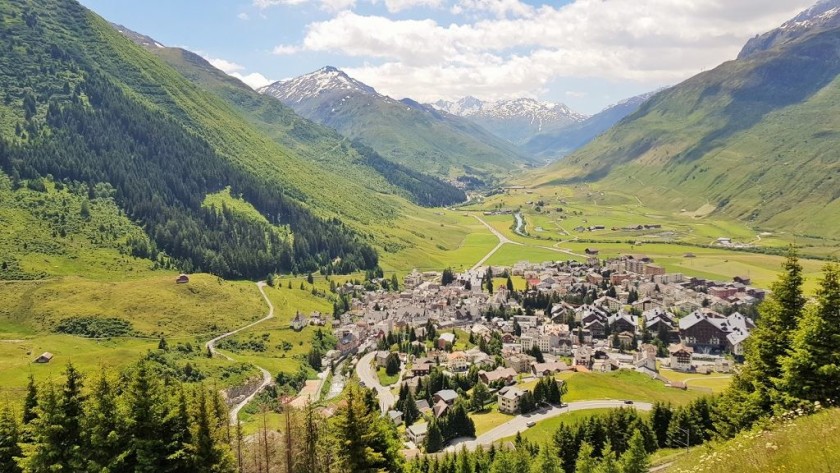
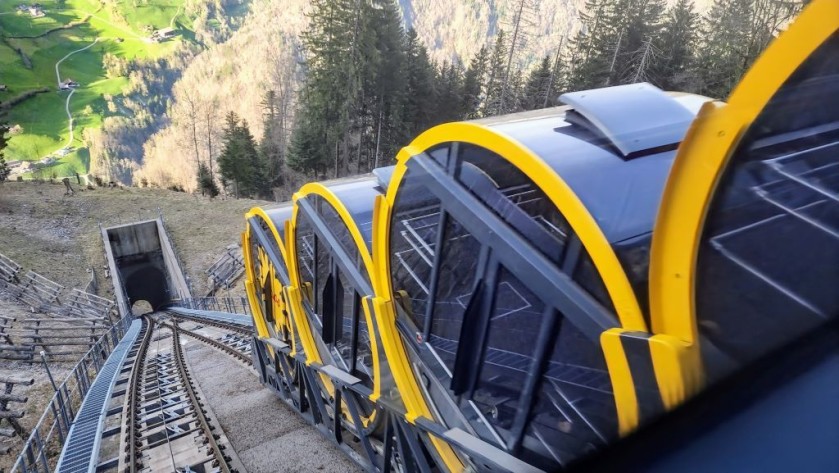
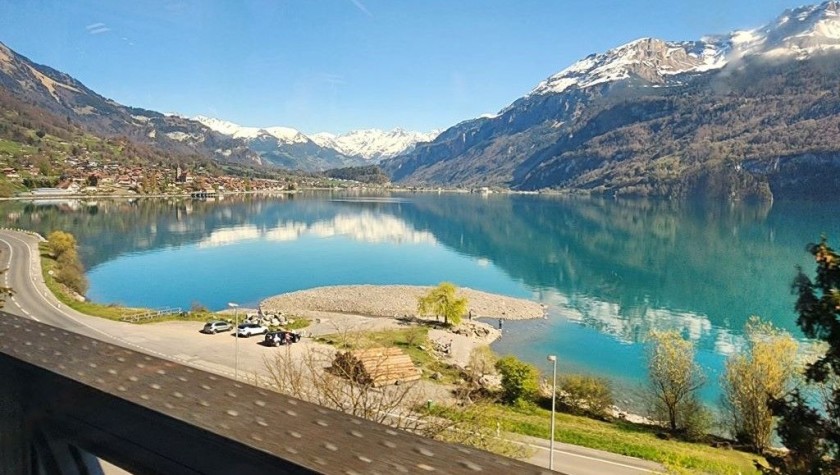
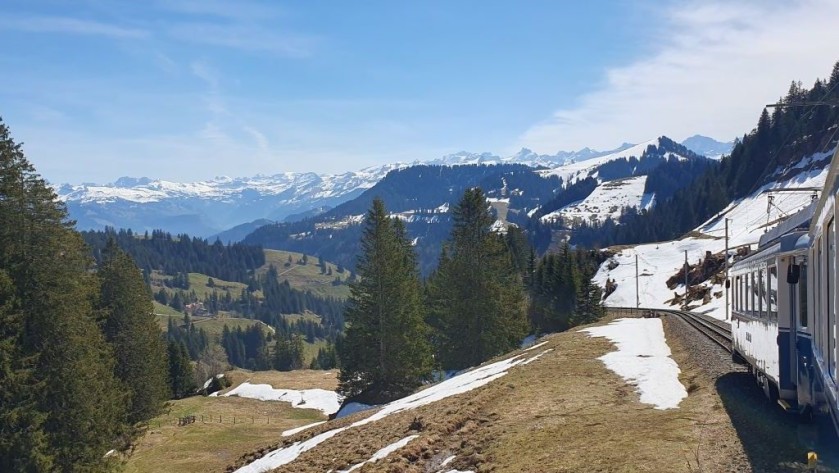
The Tell Pass, named after William Tell, can be a great value pass if you will be spending an extended period of time in locations in central Switzerland including Luzern, Fluelen, Engelberg or Stans.
It covers 2nd class rail travel, buses, lake boats and many of the cable cars and funiculars - the summer map of validity; and the winter map of validity.
Lines and routes covered by the Tell Pass include:
- The Golden Round trip up and down Mt Pilatus (not winter)
- Journeys on the PliatusBahn railway (not winter)
- the Mt Rigi Railways and cable cars
- the boats on Lake Luzern
- the trains between Luzern and both Interlaken and Engelberg
- the cable car route between Engelberg and Titlis, including the unique rotating cars
- the steam railway up Mt Brienz
- the Stoosbahn - the world's steepest funicular railway + the buses on route 501 between its base station and Schwyz rail station
- the Stanserhorn cable car
- the boat and funicular to Burgenstock
- the railway between Luzern and Goschennen and on to Andermatt
- the trains between Andermatt and Realp; connect for the Dampfbahn-Furka-Bergestrecke steam railway (not covered by the pass)
- the railway between Andermatt and Oberalp; arguably the most scenic section of the Glacier Express route.
The types of Tell Pass
The Tell Pass, is available for unlimited travel, for 2, 3, 4, 5 or 10 consecutive days in 2nd class, with children's passes a flat rate of 30CHF.
It can be booked online or at a travel desk in Swiss stations, or from tourist offices.
Prices are cheaper in winter, as some of the mountain railways will be closed.
As with the other passes for Switzerland, whether a Tell Pass will save you money depends on how it's used.
As a comparison a 2nd class Adult Tell Pass valid for 2 days, costs around 7CHF more than a Golden Round Trip on Mt Pilatus + a return rail trip to the summit of Mt Rigi.
So in addition to these two trips, you would only need to take one more journey, such as the lake boat, for the Tell Pass to be cheaper.
Or if you want to solely do the Golden Pass Trip + a return journey by train and cable cars between Luzern and Titlis, using the Tell Pass will be a money saver, compared to buying tickets.
From April 1st 2026
The name of the pass will be changing to the Lucerne Travel Pass and it will become a year round pass, also the 2 day version will be discontinued.
Comparing the Tell Pass with the Swiss Travel Pass
The Tell Pass is only available for consecutive days of travel and a 3 day Tell Pass for summer at the time of writing costs CHF 220, while a 2nd class Swiss Travel Pass for 3 days of consecutive travel is at the time of writing, costs CHF 232.
So at face value the Swiss Travel Pass is better value for money, less than 15 Swiss Francs more to see all of Switzerland by train instead of being restricted to the area around Luzern/Lucerne covered by the Tell Pass.
However, on some of the routes in the Luzern area, what's covered by the Tell Pass, is more generous than the Swiss Travel Pass.
The level of discount comparison is
- The Golden Round trip up and down Mt Pilatus: Tell Pass = 100%; Swiss Travel Pass = 50%
- Journeys on the PliatusBahn railway (not winter): Tell Pass = 100%; Swiss Travel Pass = 50%
- The cable car route between Engelberg and Titlis, including the unique rotating cars: ): Tell Pass = 100%; Swiss Travel Pass = 50%
- The steam railway up Mt Brienz: Tell Pass = 100%; Swiss Travel Pass = 50%
So if you want to take these routes and journeys, the balance tips towards the Tell Pass.
In contrast the journeys and railways are included at no extra costs with both the Tell Pass and the Swiss Travel Pass includes:
- the Mt Rigi Railways and cable cars;
- the boats on Lake Luzern;
- the trains between Luzern and both Interlaken and Engelberg;
- the Stoosbahn - the world's steepest funicular railway + the buses on route 501 between its base station and Schwyz rail station;
- the railway between Luzern and Goschennen and on to Andermatt, Oberalp and Realp.
Though the Swiss Travel Pass covers the entire Chur > Oberalp > Andermatt >- Realp > Brig route.
Berner-Oberland Pass:
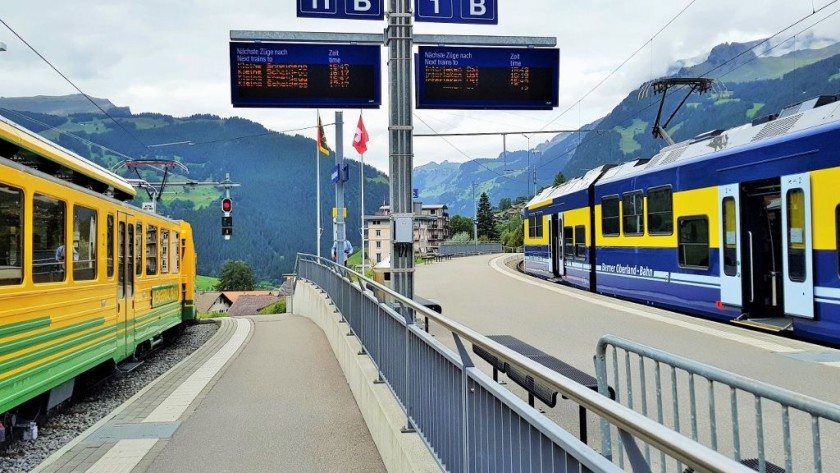
- If you want to base yourself in central Switzerland for an extended period of time, a Berner-Oberland Pass is a lesser known pass, which can be great value for money.
You can choose passes valid for 3 days, 4 days, 6 days, 8 days and 10 days of consecutive travel; there ae no flex versions of Berner-Oberland Passes.
They are available in 1st and 2nd class, and children and dogs are charged a flat rate of CHF 30, no matter how long the pass is valid for and whether you opt for 1st or 2nd class.
Berner-Oberland Pass changes for 2025
- The entire Interlaken Ost ↔ Montreux route is now included; So holders of Berner-Oberland passes now need to only pay the reservation fee to travel on the Golden Pass Express services - Or the regular trains can be ridden at no extra charge.
- The pass now fully covers the cable car to Schilthorn; So the pass now covers the full trip from Interlaken to Schilthorn.
- The Berner-Oberland Pass now only gives a 50% discount on the Grindelwald First cable car and the Harder-Kulm funicular railway.
- The Berner-Oberland Pass now only gives a 25% discount on:
- the WAB railway: Grindelwald - Kleine Scheidegg - Wengen; the pass still covers Wengen - Lauterbrunnen.
- the Eiger Express cable car
- the JB railway between Kleine Scheidegg and Jungfraujoch via Eigergletscher - pass users used to be able to travel at special price.
So the Berner Oberland Pass now only matches the Swiss Travel Pass discount on these three routes!
The main routes now fully covered by the pass:
- the MOB railway routes; Montreux ↔ Interlaken Ost via Zweisimmen + the railway between Zweisimmen and Lenk;
- the Luzern ↔ Interlaken Ost route; so the pass covers the full Luzern ↔ Montreux 'Golden Pass route;
- the BOB railway between Interlaken and both Grindelwald and Lauterbrunnen;
- the railway to Schynige-platte
- the section of the WAB railway route between Lauterbrunen and Wengen;
- Lauterbrunnen ↔ Mürren; And now the cable car on to Schilthorn;
- the Grindelwald - Männlichen - Wengen cable car route;
- the Grindelwald – Pfingstegg cable car;
- The spectacular steam powered Brienz Rothorn Bahn railway + the Rothorn-Sorenberg cable car;
- The Meiringen–Innertkirchen railway, operated by ZB;
- All of the rail routes between Bern and Interlaken;
- The railway route Spiez ↔ Brig via Kandersteg and Goppenstein - and on to Domodossola in Italy, by the BLS and not the SBB trains + the cable car routes from Kandersteg and Goppenstein;
- The Bern to Luzern rail route via Langnau;
- The boats on Lake Brienz and Lake Thun;
- The post-bus networks of routes around Brienz / Meiringen and Gstaad and Interlaken / Spiez.
So the pass covers five of SMTJ's Top 20 Most Beautiful Swiss Rail Journeys:
- Montreux ↔ Zweisimmen
- Interlaken ↔ Luzern
- Thun ↔ Interlaken Ost
- the Lotschberger route by the BLS and not the SBB trains; Spiez ↔ Brig via Kandersteg (and on to Domodossola in Italy until Dec 31st 2025)
- Lauterbrunnen ↔ Wengen, the highlight of the Kleine Scheidegg > Lauterbrunnen route
And that route by steam train on Mt Brienz almost certainly deserves to be on that list, but we have yet to travel on it.
at a 50% discount
- Brig ↔ Andermatt, which is part of the Glacier Express route; And on to Goschenen, which has direct trains to Luzern
- Luzern ↔ Engelberg + all of the cable car routes from Engelberg including the Mt Titlis rotating cable car
- the Grindelwald First cable car
- the railway to Schynige-platte
- the Harder-Kulmfunicular railway.
at a 25% discount
- the WAB railway: Grindelwald - Kleine Scheidegg - Wengen
- the Eiger Express cable car Grindelwald ↔ Eigergletscher
- the JB railway between Kleine Scheidegg and Jungfraujoch via Eigergletscher.
The validity area map, which also includes numerous post-bus routes, can be downloaded from this page; which also includes details of the cable cars and funiculars on which the pass users can either ride for free or travel at a 50% rate.
The list of the public transport discounts available with the Berner Oberland Pass can also be accessed here.
Comparison of Berner-Oberland Passs and Swiss Travel Passes
An example price comparison is:
- An Adult 2nd Class Berner-Oberland Pass for 4 days of consecutive travel = CHF 280.
- An Adult 2nd Class Swiss Travel pass for 4 days of consecutive travel = CHF 295.
So at face value, the Swiss Travel Pass is better value for money - all of Switzerland for only an additional fifteen Swiss francs,
Even if you will be spending an extended period of time in the Berner-Oberland area, you will only need to take one long-distance and wholly feasible day trip to the likes of St Moritz, Lugano or Zermatt, for the value balance to tip towards the Swiss Travel Pass.
However, the balance tips towards the Berner-Oberland Pass if:
- you will solely be travelling in the area covered by the pass, or
- if you want to take multiple rides / journeys on which the Berner-Oberland Pass offers a greater discount / saving than Swiss Travel Passes.
The railways and cable cars on which the Berner-Oberland Pass discount / saving is greater, includes:
- the cable car on to Schilthorn;
- the Grindelwald - Männlichen - Wengen cable car route;
- the Grindelwald – Pfingstegg cable car;
- the Brienz Rothorn Bahn steam railway;
- the Rothorn-Sorenberg cable car;
- most of the boats on Lake Brienz and Lake Thun.
Though there are also two routes which are fully covered by the Swiss Travel Pass, but Berner-Oberland Pass users only receive a 50% discount:
- Brig ↔ Andermatt
- Luzern ↔ Engelberg,
Comparison of Berner-Oberland Passs and Jungfrau Travel Passes
An example price comparison is:
- An Adult 2nd Class Berner-Oberland Pass for 4 days of consecutive travel = CHF 280.
- An Adult 2nd Class Jungfrau Travel Pass for 4 days of consecutive travel = CHF 235.
The area of validity of the Jungfrau Travel Pass is less than 20% of that covered by the Berner-Oberland Pass, but the differences in how the two passes can be used on the railways and cable cars between Interlaken and Jungfraujoch in 2025, is now more stark, thanks to recent changes to the coverage of the Berner-Oberland Pass.
Covered by the Jungfrau Travel Pass; 25% discount to Berner-Oberland Pass users:
- the WAB railway: Grindelwald - Kleine Scheidegg - Wengen
- the Eiger Express cable car Grindelwald ↔ Eigergletscher
Covered by the Jungfrau Travel Pass; 50% discount to Berner-Oberland Pass users:
50% discount to Jungfrau Travel Pass users; 25% discount to Berner-Oberland Pass users:
- the JB railway between Kleine Scheidegg and Jungfraujoch via Eigergletscher
Fully covered by both Jungfrau Travel Passes and Berner-Oberland Passes:
- the BOB railway between Interlaken and both Grindelwald and Lauterbrunnen;
- the section of the WAB railway route between Lauterbrunen and Wengen;
- Lauterbrunnen ↔ Mürren;
- the Grindelwald - Männlichen - Wengen cable car route;
- the Grindelwald – Pfingstegg cable car.
Half Fare Cards + Berner Oberland Passes
If you were to also purchase a Half Fare Card for visitors to Switzerland which costs CHF 120, you will then make the following savings when purchasing a Berner Oberland Pass:
3 day Pass = CHF 80
4 Day Pass = CHF 95
6 Day Pass = CHF 115
8 Day Pass = CHF 130
10 Day Pass = CHF 140
So a combination of Half Fare Card + Berner Oberland Pass+ train tickets to and from destinations not covered by the pass, can be a money saver
The Jungfrau Travel Pass
The Jungfrau Travel Pass covers;
- the trains between Interlaken Ost and both Grindelwald and Lauterbrunnen
- the trains beyond Grindelwald and Lauterbrunnen on to Kleine Scheidegg,
- all of the cable car routes from Grindelwald, including the Eiger Express to Eigergletscher,
- the trains between Eigergletscher and Kleine Scheidegg,
- the trains between Wilderswill and Schynige Platte
- Lauterbrunnen <> Mürren
Plus holders of Jungfrau Travel Pass can travel at special price between Kleine Scheidegg and Jungfraujoch, which is around half of the usual fare.
Jungfrau Region - Winter Hiking and Sledging Pass
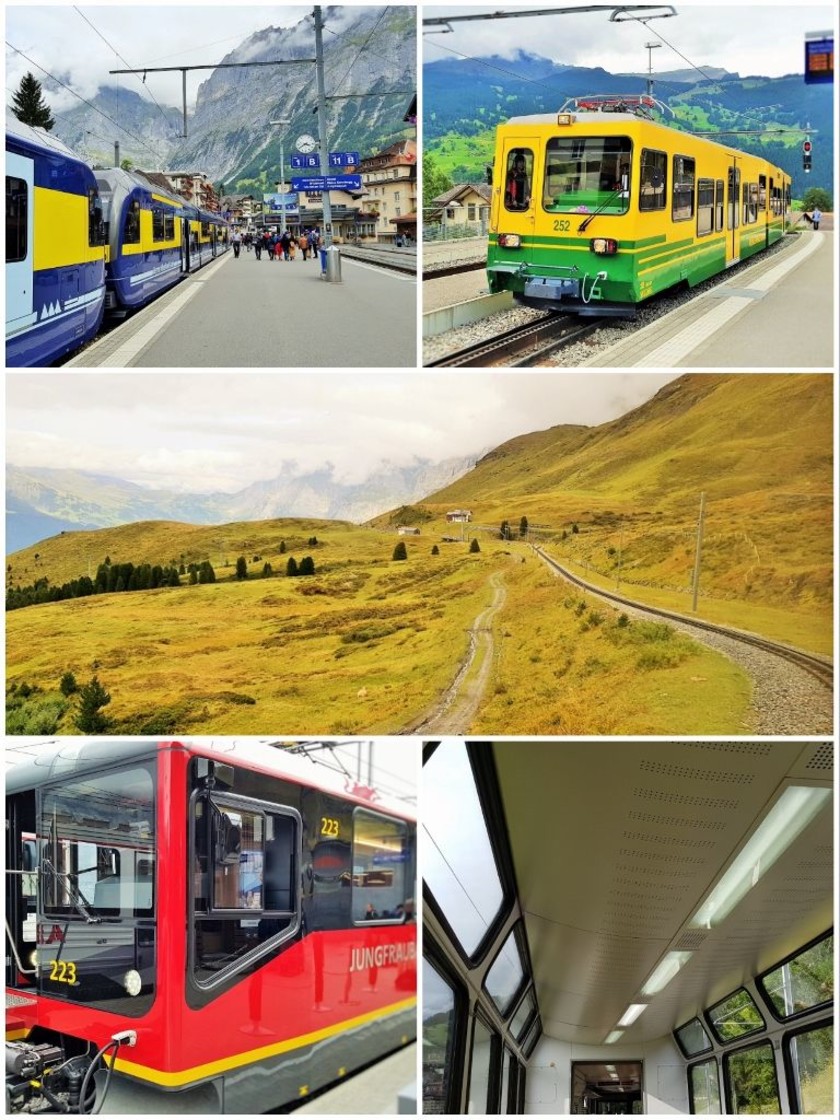
The Top of Europe Winter Pass for the Jungfrau region (Grindelwald, Lauterbrunnen, Kleine Scheidegg, Jungfraujoch and Wengen) has been discontinued - and has in effect been replaced by the Winter Hiking and Sledging Pass.
The pass lives up to its name, as it provides access to the Jungfrau region's many hiking trails and sledging areas
However, if you don't want to hike or jump on a sledge, but do want to ride the region's trains, cable cars and funiculars, the pass can be great value for money.
The Winter Hiking and Sledging Pass is available for 1 to 7 days of consecutive travel - there isn't a flex option
There are discounted rates for Youths (aged 16 to 19) and children (aged 6 to 15) - but there doesn't seem to be an option of obtaining a discount by using a Half Fare Card.
The included routes routes / journeys with the Winter Hiking and Sledging Pass are:
Trains:
- Interlaken ↔ Grindelwald / Lauterbrunnen
- Grindelwald ↔ Kleine Scheidegg ↔ Wengen ↔ Lauterbrunnen
- Kleine Scheidegg ↔ Eigergletscher
- Lauterbrunnen ↔ Mürren (including the Luftseilbahn funicular)
Purchasers of passes valid for 3 days or more can travel between Eigergletscher and Jungfraujoch for a special price of CHF 65.
Cable cars and Funiculars
- Grindelwald Terminal ↔ Eigergletscher (Eiger Express)
- Grindelwald Terminal ↔ Männlichen
- Männlichen ↔ Wengen (Dec 9th to Apr 7th)
- Grindelwald First (Dec 16th to Apr 1st)
- Mürren ↔ Allmendhubel
On the Schilthornbahn purchasers of passes valid for 3 days or more will receive a 50% discount
Buses:
- local buses in Grindelwald (not with a 1 day pass)
- Grindelwald ↔ Bussalp (not with a 1 day pass)
- Orstbus Lauterbrunnen
- Lauterbrunnen ↔ Stechelberg
Ski lifts:
- Sesselbahn Arven (Kleine Scheidegg)
- Sesselbahn Innerwengen (Wengen)
- Sesselbahn Schiltgrat (Mürren)
An Adult pass valid for 3 days is priced at CHF 168 (around €245) but a full price return ticket by train between Interlaken and Jungfraujoch will cost more than CHF 200.
Though if you'll want to travel on other Swiss Mountain Railways or visit other areas of Switzerland you'll also save money if you combine the Winter Hiking and Sledging Pass with other Passes/Cards.
On most of the routes fully covered by the Winter Hiking and Sledging Pass, the users of Swiss Travel Passes only obtain a 25% discount.
The bespoke travel planning service can assist with working out which combinations of passes and tickets, will provide the best value for money for an extended stay in Switzerland.
Léman - Alpes Pass
The Léman - Alpes Pass covers a network of rail and bus routes in north-west Switzerland
The primary rail routes included are;
- Geneve - Nyon - Morges - Lausanne - Vevey - Montreux - Villeneuve - Aigle - Bex - St Maurice
- the routes between Lausanne and Gruyères
- Montreux <> Rochers-De-Naye, operated by MVR
- the Montreux - Montbovon - Gstaad - Zweisimmen - Lenk route, operated by MOB
- trains on three separate routes between Aigle and the resorts of Champery, Les Diablerets and Leysin. operated by TPC
- the BVB railway route between Bex and Bretaye via Villars-sur-Ollon, also operated by TPC.
Also included are all the boat routes on Lake Geneva.
So this can save money if you will be spending an extended period of time around Lausanne or Montreux - in the winter sports season you can stay in either of those locations and head off to different ski resorts on day trips.
Prices per Adult are:
- 5 days 2nd class = CHF 105
- 5 days 1st class = CHF 155
- 7 days 2nd class = CHF 130
- 7 days 1st class = CHF 190
The travel days are consecutive
The pass cannot be booked online.
What's unusual about this pass is that with a 5 day pass you get 2 days of unlimited free travel, but on the other 3 days you pay 50% of the ticket prices.
Similarly with a 7 day pass, you get 3 days of free travel, but on the other 4 days you pay 50% of the ticket prices.
Comparison with Swiss Travel Passes
A 5 day Léman - Alpes Pass is more than CHF 150 cheaper than a 4 Day Swiss Travel Pass.
Though in contrast the Swiss Travel Pass has unlimited free travel over all of its 4 days - and it includes the same railways and boats as the Léman - Alpes Pass (except for Montreux <> Rochers-De-Naye, as this is 50% with a Swiss Travel Pass).
Though if you will be remaining within the area around Lake Geneva, the Léman - Alpes Pass will almost certainly be the cheaper option.
Not sure which pass is right for you?
ShowMeTheJourney offers a bespoke travel planning service, which can work out for a fee, which rail pass for Switzerland will provide the best value for money for your trip.
The recommendation may be purchasing a combination of passes, plus if you will be travelling in Switzerland and other countries by train, the service can also calculate whether Eurail or Interrail and / or passes valid for Switzerland, will be the best way to go.
Send an email with your travel plans to simon@showmethejourney.com
Then if the genuine recommendation is to purchase a Swiss Travel Pass, or a Berner Oberland Pass, or a Tell Pass and you make the purchase through ShowMeTheJourney, the consultation fee will be waived!
Travelling with Children
Children aged 5 and under travel for free on Swiss trains, but if you will be travelling with children aged 6 to 15, this can make a difference as to which of the rail pass options for Switzerland will be better value for money.
That's because the terms and prices for children differ according to the types of pass:
- Swiss Travel Pass = free travel with an Adult pass user
- Saver Day Pass = One Day Pass for Children at a flat rate of 19CHF for 2nd class and 33CHF for 1st class
- Top Of Europe Pass = flat rate of 30CHF
- Berner-Oberland Pass = flat rate of 30CHF
- Tell Pass = flat rate of 30CHF
- The Léman - Alpes Pass offers a reduced price for children aged 6 to 15: 5 days 2nd class = CHF 50; 5 days 1st class = CHF 75; 7 days 2nd class = CHF 65; 7 days 1st class = CHF 95.
While for Interrail pass users, two children aged 12 and under can travel for free with each adult pass holder; though for kids aged 5 to 12 you need to add a pass when booking.
Or if you want more freedom than the pass provide or will be spending up to a month in Switzerland, Half Fare Guest Cards, which are valid for a month of travel, can be extended to be Swiss Family Cards at no extra cost.
|Children aged 6 to 15 at the time of the trip then travel for free when accompanied by an adult travelling with the Half Fare Card.
Using Eurail and Interrail passes in Switzerland:
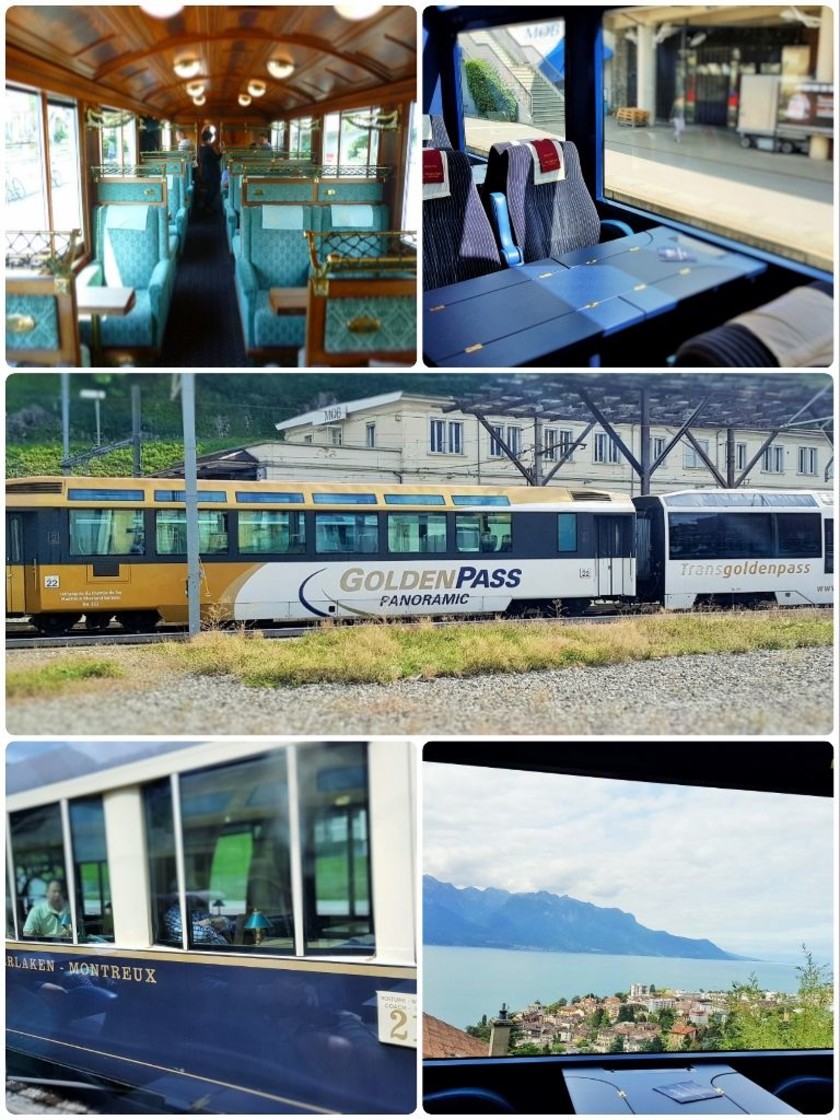
As tickets for certain journeys in Switzerland can be comparatively expensive, adding multiple Swiss destinations to an Interrail or Eurail pass itinerary, can go a long way to ensuring that a Eurail Global or an Interrail ‘Global’ pass will save you money.
*Eurail does NOT offer a one country pass solely for travel in Switzerland by train, but Interrail offers a pass that can solely be used in Switzerland, plus Switzerland is also one of the countries in which pan-European 'Global' passes can be used.
You are more likely to make savings with these passes, in comparison to buying tickets, if you travel on the independent railway networks on which Eurail and Interrail passes ARE valid.
Fantastic independent lines on which Eurail and Interrail passes CAN be used at no additional charge include:
- the RhB network (Chur, St Moritz, Tirano, Kolsters, Davos)
- The Golden Pass (MOB and ZB) route between Montreux and Luzern.
- the ‘Centovalli’ Line between Locarno and Domodossola.
- the MGB lines including the Disentis/Muster – Andermatt – Brig – Zermatt route.
So Interrail and Eurail Passes can now be used on the four longest Swiss mountain routes, on which Swiss Travel Passes also enable free travel.
A tip if you'll be in Switzerland with a Eurail or Interrail pass is to avoid paying the comparatively expensive charges, for a journey or two on the lines on which Eurail and Interrail passes don't allow for free travel.
Yes these other lines are also fabulous, but not (IMHO) so exponentially more wonderful to justify the (high) costs of using a Eurail or Interrail pass to travel on them.
Eurail and Interrail Passes are also valid on all Swiss mainline (SBB and BLS) trains, including the local trains AND the express IC and IR services; you can hop on any of these trains with your valid pass, as seat reservations aren't required.
This also applies when German ICE trains travel in Switzerland on the Basel ↔ Chur and Basel ↔ Interlaken routes.
There’s also no need to pay reservation fees for journeys WITHIN Switzerland, if you travel by a train service on which reservation fees apply to international journeys.
Some examples of routes on which this applies includes:
(1) Basel ↔ Zurich by TGV-Lyria trains,
(2 Geneve/Lausanne ↔ Visp/Brig by EC trains,
(3) Basel - Olten - Bern - Thun - Spiez - Visp - Brig by EC trains,
(4) Zurich ↔ Bellizona/Lugano by EC trains.
Comparing an InterRail country pass with a Swiss Travel Pass:
Considering these FOUR factors can help decide which pass is the right option for your travel needs:
(1) A one country Interrail Pass for Switzerland is around 40% cheaper than an equivalent Swiss Travel Pass (in terms of numbers of travel days that a pass is valid for).
(2) The price difference reflects the fact that the Swiss Travel Pass is valid on more independent railways, than the Interrail Pass; and also gives access to free or discounted travel on many funiculars and cable cars.
(3) And the fact that the Swiss Travel Pass is valid on public transport networks, most Swiss lake cruises AND has free or discounted entry to many more museums/galleries and attractions than Interrail passes.
So if you'll have to time to visit museums, galleries etc, then the balance can tip towards the Swiss Travel Pass.
(4) Though if your itinerary is focused primarily on train journeys and you’re happy to NOT include these popular lines...
(a) The lines up Mt Rigi
(b) Zermatt – Gornegrat
(c) the PB line up Mount Pilatus
(d) the AB and BRB and TPC lines.
...on your itinerary, the balance can tip in favour of a one country Interrail pass.
Using rail passes on Special Trains
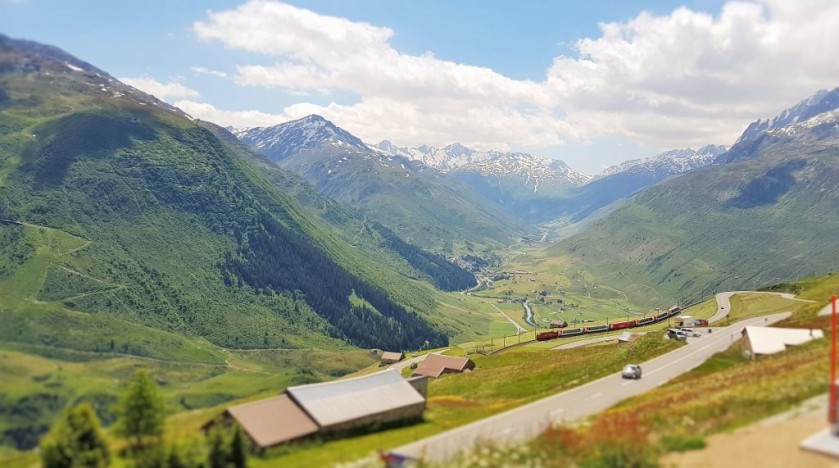
If you have a Swiss Travel Pass, or a Eurail or Interrail pass that’s valid in Switzerland, you now only have to pay the reservation fee for journeys on the The Glacier Express or in the panoramic cars on The Bernina Express or on The Golden Pass Express.
The respective guides to each of these train services include details of how to book the reservations.
The reservation are a fixed rate, irrespective of the distance you will be travelling; so using any of these passes to travel the entire journey on these trains is a great deal!
Save 5% on Swiss Rail Holidays with exclusive Promo codes
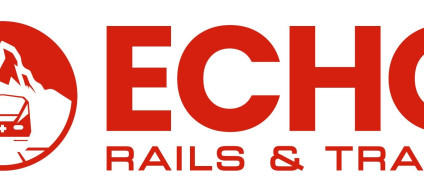
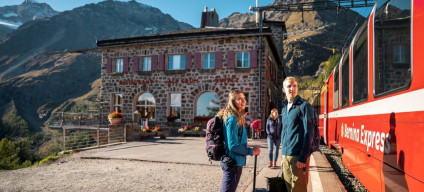
Other guides to Swiss train travel:
To and from Switzerland with Eurail & Interrail
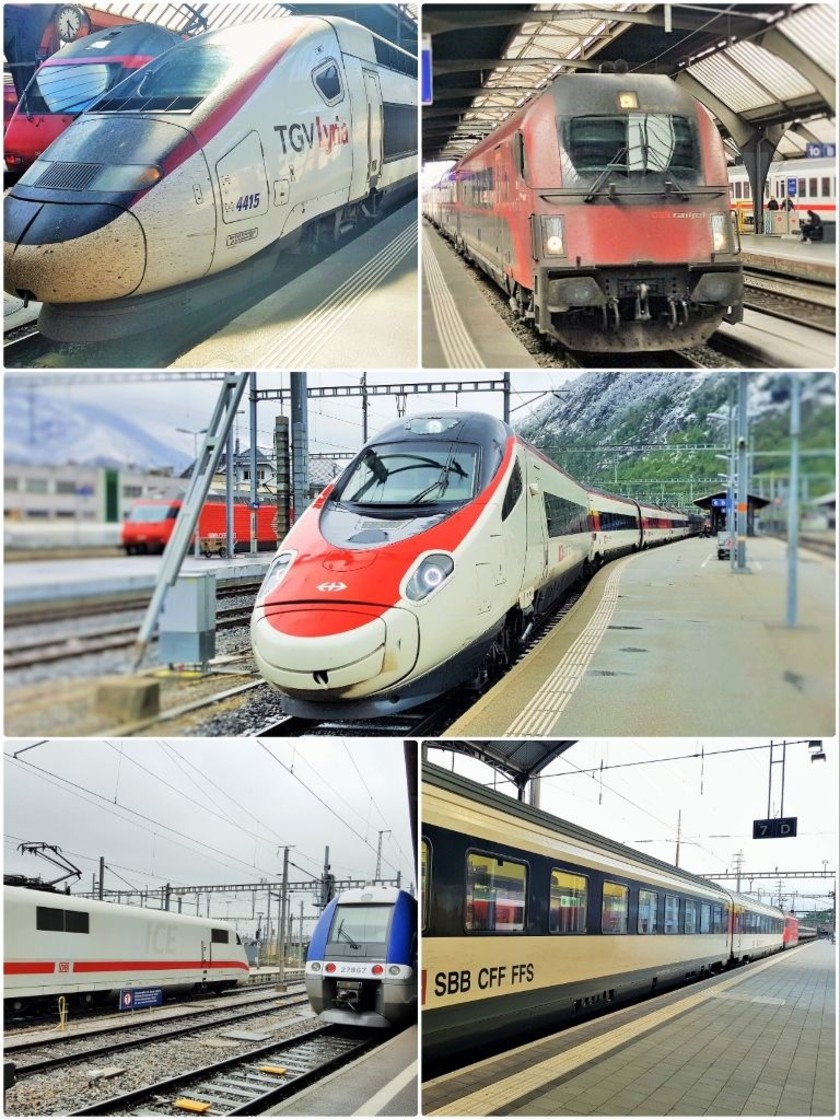
You can avoid having to pay rail reservation fees/supplements by taking trains from and to Switzerland on which reservations aren't available.
These are all of the cross border local trains PLUS these regional train services:
(1) to/from Germany - Regio
(2) to/from France - TER
(3) to/from Italy - Regionale
Routes with optional reservations:
Rail pass reservations are also optional on these DAYTIME express trains from/to Switzerland:
(1) international ICE and IC trains between Switzerland and Germany
(2) on the EC (EuroCity) trains between Switzerland and Germany/Austria
(3) the Railjets between Switzerland and Austria/Hungary
Booking these optional rail pass reservations:
The availability of seats isn't guaranteed for the entire journey, particularly when travelling in 2nd class on the ICE and EC trains to/from Germany, so opting to reserve is recommended for long journeys.
However, you will charged a booking fee of more than 11-CHF per reservation, if you book seats for international trains at a Swiss station.
Rail pass reservations for INTERNATIONAL journeys from Switzerland also CAN'T be booked on SBB's online seat reservation service.
The reservations for journeys from Switzerland to Germany can be purchased on the DB (German national railways) booking website up to 6 months ahead and cost €5.30 when using 1st class passes and €4 when using 2nd class passes.
How to do this is explained here.
The optional reservations for journeys by Railjet train from Switzerland to Austria can be booked up to 6 months ahead online with OBB - the fee is €3, whether you have a 1st or 2nd class pass.
How to do this is explained here.
Journeys with mandatory reservations:
If you know that you will want to reserve on a train with compulsory reservations – which are:
- all overnight trains from Switzerland,
- the Lyria trains to France,
- the EC trains to Italy (international journeys only)
... be aware that reservations for these international trains can't be booked on SBB's online seat reservation service; and the Italian national rail company, Trenitalia, now no longer sells rail pass reservations for the EC trains between Switzerland and Italy online.
The reservations for direct journeys by these EC trains can booked, without paying any additional fees, on the website of Austria's national rail operator, OBB.
It's best not to question the logic of this and use the only option for booking reservations on these trains, without incurring any additional expense.
Though the steps to take on the OBB website aren't particularly obvious, hence this guide* to booking Eurail/Interrail reservations with OBB.
The OBB website will also sell reservations to Interrail and Eurail pass users for journeys by the overnight Nightjet services from and to Switzerland.
The other option for booking reservations on these EC and Nightjet trains before arriving in Switzerland, is to book reservations online, by using the Eurail reservation service or the Interrail reservation service but you will be charged a €2 booking fee per reservation.
These Eurail and Interrail reservation services are the only option for booking reservations online for the Lyria trains and the night trains from Switzerland that aren't Nightjets.
However, if you wait until you are in Switzerland and book rail pass reservations for international trains at a Swiss station, you will charged a booking fee of more than 11-CHF per reservation.
OR if you will be travelling through Germany prior to arriving in Switzerland, you can pay for reservations for these trains at a Reisezentrum travel desk in any hauptbahnhof station - and won't be charged a booking fee at all.
Example of rail pass reservation fees:
Basel/Geneve/Lausanne/Zurich – Paris (Lyria*) = €35 - 1st; €25 - 2nd
Basel/Bern/Geneve/Luzern/Zurich - Milano (EC**) = €13 - 1st and €11 - 2nd
Money Saving Tips:
*= To avoid paying these particularly expensive rail pass reservation fees on the Lyria trains, you can take TER trains from Basel to Mulhouse or from Geneve to Lyon.
Take a TGV on to your final destination from Mulhouse or Lyon and the reservation for the TGV can be as low as €10 for both 1st and 2nd class pass users.
Or if you are willing to have a slower end-to-end journey, you can avoid paying any reservation fees when travelling from Basel and Zurich to Paris, or from Geneva to Paris.
**= Alternative options are available to the EC trains to Italy, which can save the reservation rail pass reservation fee on these trains (and the booking fee if you haven’t made reservations before arriving in Switzerland).
On the Gotthard route via Lugano take an IR train from Basel or Zurich to Cadenazzo and connect there for Regio train to Milano.
Do this and not only will you save money, you’ll also get to experience one of the most scenic routes in all of Europe - more information re; the required connections when travelling travelling to Milan or Venice from Zurich.
If you’re planning to travel to Italy via Brig, then there is a daily direct IC train from Basel and Bern to Domodossola.
And now there are also 3 x regional trains per day from Bern to Domodossola, which are branded 'Lotschberger' because they take a more scenic route than the express trains.
You can connect at Domodossola into a Regionale (RV) train on to Milano.
Please support ShowMeTheJourney
This second version of ShowMeTheJourney is exciting and new, so we are genuinely thrilled that you are here and reading this, but we also need your help.
We’re striving not to let anything get in the way of providing the most useful service possible, hence a facility has been set up with DonorBox which can be used to support the running costs and make improvements.
Instead of advertising or paywalls, your financial support will make a positive difference to delivering an enhanced service, as there’s a lot of ideas which we want to make happen.
So if you have found the info provided here to be useful, please go here to say thank you.
Itineraries from Basel:
If you want to tick off the ‘Grand Tour of Switzerland' railway routes, then Basel is an ideal base for a rail pass itinerary, particularly in the summer when the daylight hours are longest.
If you want to take one, two, or three of these itineraries, a Saver Day Pass for each day of travels will be a money saver.
If you want to follow more than three of these routes you will save with a Swiss Travel Pass; and if you'll want to make the most of the other inclusions on the Swiss Travel passes, the lake cruises, funiculars, galleries and museums etc, the Swiss Travel Pass can also be good value for money if you follow just three of the suggested routes.
All of the routes below can be accomplished in a day.
The schedules may seem daunting, but virtually all the connections are as simple as possible.
Journeys with a single * are those which Eurail/Interrail users have to pay a reduced fee
Journeys with a double ** are those on which all rail pass users have to pay a reduced fee.
1: The Golden Pass route : Basel – Visp – Montreux – Zweisimmen – Spiez – Interlaken Ost – Luzern – Basel
2: The Glacier/Bernina Express Route #1: Basel – Chur – St Moritz – Chur – Zurich – Basel
3: The Glacier Express route #2: Basel – Visp – Zermatt – Visp – Andermatt – Disentis/Muster – Chur – Zurich – Basel
4: The Centovali and The Gotthard Express route: Basel – Domodossola – Locarno – Bellinzona – Basel
5: Mount Rigi: Basel – Luzern → boat to Vitznau * → Rigi * → Arth-Goldau* → Fluelen → boat to Luzern* → Basel
6: The Bernese-Oberland: Basel – Interlaken Ost - Lauterbrunnen **→ Kleine Scheidegg **→ Jungfraujoch **→ Kleine Scheidegg → Grindelwald ** → Interlaken Ost – Basel
7: The Voralpen Express and Schaffhausen Falls: Basel – Luzern – St Gallen – Schaffhausen – Zurich - Basel
8: Mont Blanc and The Lotschberger: Basel – Biel – Lausanne – Martigny – Vallorcine – Chamonix-Mont Blanc – Vallorcine – Martigny – Brig – Thun/Bern via Kandersteg - Basel.
Itineraries from Zurich:
It may not seem obvious from looking at a map, but if you want to tick off the ‘Grand Tour of Switzerland' railway routes, then Zurich is a good base for a rail pass itinerary, particularly in the summer when the daylight hours are longest.
Basing yourself in the city saves you the bother of having to switch hotels during a holiday.
If you want to take one, two, or three of these itineraries, a Saver Day Pass for each day of travels will be a money saver.
If you want to follow more than three of these routes you will save with a Swiss Travel Pass; and if you'll want to make the most of the other inclusions on the Swiss Travel passes, the lake cruises, funiculars, galleries and museums etc, the Swiss Travel Pass can also be good value for money if you follow just three of the suggested routes.
All of the routes below can be accomplished in a day.
The schedules may seem daunting, but virtually all the connections are as simple as possible.
Journeys with a single * are those which Eurail/Interrail users have to pay a reduced fee.
Journeys with a double ** are those on which all rail pass users have to pay a reduced fee.
1: The Golden Pass route: Zurich → Visp → Montreux → Zweisimmen → Spiez → Interlaken Ost → Luzern → Zurich
2: The Bernina Express route #1: Zurich → Chur → Samedan → Pontresina → Tirano → Pontresina → Samedan → Chur → Zurich
3: The Glacier Express route #2: Zurich → Visp → Zermatt → Visp → Andermatt → Disentis/Muster → Chur → Zurich
4: The Centovali Express and The Gotthard Express route: Zurich → Brig → Domodossola → Locarno → Zurich
5: The Mount Rigi route: Zurich → Luzern → boat to Vitznau → Rigi-Kulm → Arth-Goldau → Fluelen → boat to Luzern → Zurich
6: The Voralpen Express and Schaffhausen Falls: Zurich → Schaffhausen → St Galllen → Luzern → Interlaken Ost → (Bern) → Zurich
7: The Mont Blanc Express route and The Lotschberger: Zurich → Lausanne → Martigny → Vallorcine → Chamonix-Mont Blanc → Vallorcine → Martigny → Brig → Thun or Bern via Kandersteg → Zurich
8: The Bernese Oberland Railways: Zurich → Spiez → Interlaken Ost →* Grindelwald →* Kleine Scheidegg →* Jungfaujoch →* Kleine Scheidegg →* Lauterbrunnen →* Interlaken Ost → Zurich
Users of Saver Day Passes don't qualify for the discount on the Berner Oberland routes unless they also have the Half Fare Card.
Other rail pass guides:

Simon Harper
I wanted to share my passion for train travel and explain how anyone can take the fantastic journeys I have taken.

This is one of more than 100 train travel guides available on ShowMeTheJourney, which will make it easier to take the train journeys you want or need to make. As always, all images were captured on trips taken by ShowMeTheJourney.
This second version of ShowMeTheJourney is exciting and new, so we are genuinely thrilled that you are here and reading this, but we also need your help.
We’re striving not to let anything get in the way of providing the most useful service possible, hence a facility has been set up with DonorBox which can be used to support the running costs and make improvements.
Instead of advertising or paywalls, your financial support will make a positive difference to delivering an enhanced service, as there’s a lot of ideas which we want to make happen.
So if you have found the info provided here to be useful, please consider saying thank you.










